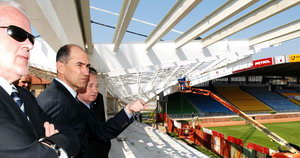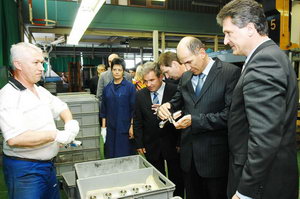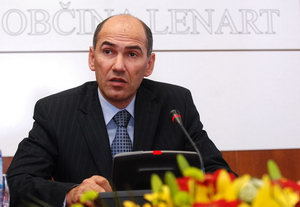Today the Prime Minister of the Republic of Slovenia, Janez Janša, and members of the cabinet continued their visit to Podravje and arranged the main working conference in Maribor Pohorje, organising as many as 83 different events and meetings. The first visit for two years is intended to review the work which has been done, and to see how the promises and agreements of two years ago have been implemented. At the conference the government studied the situation in the 22 municipalities of the Podravje region, analysed their potential, and discussed developments and perspectives.

(Photo: Arsen Perić/Salomon 2000)
The PM then went to inspect the Ljudski vrt sport and tourist centre, a project which is a model for good successful collaboration between local authorities and the government, and of the phasing out of European funds. Ljudski vrt football stadium is a natural, cultural, architectural and sports attraction and the pride of the city of Maribor. Renovation work began last year. The first phase of renovation was partly financed by the government, which contributed one million euros. When the work is completed Ljudski vrt stadium will be a modern venue built to European standards, with 13,000 covered seats and additional premises.

(Photo: Arsen Perić/Salomon 2000)
The PM also visited the Mariborska livarna foundry, which produces 1 million single-control taps and is the fourth biggest manufacturer of these products in the EU. Representatives of the company explained that their aim is to become the biggest manufacturer of aluminium castings for the highly demanding automobile, electrical, and mechanical engineering industry and of single-control taps and aluminium radiators in Central and South-Eastern Europe. Mr Janša stressed that Mariborska livarna had ambitious plans for the future and encouraged them to continue their successful management, as with the adoption of the euro the Slovenian economy had become part of a very stable monetary environment and several potential risks have ceased to pose a threat. According to Mr Janša, future economic policy will continue to aim for reasonable growth of costs?prices, which is fundamental for ensuring Slovenia's competitiveness internationally. The participants at the meeting also exchanged views on the significance of further developing the energy sector and ensuring a reliable electricity supply to the business sector.

(Photo: Arsen Perić/Salomon 2000)
At a press conference in Lenart the PM said one of the key promises which the government had kept was the amendment to the Act on Local Finances, which has provided an additional 18 million euros to the twenty-two municipalities in Podravje, which they can earmark for development projects.
Since the government's last visit to the region, the Resolution on National Development Projects has been passed. It includes projects which will be partly or fully carried out in Podravje, including the Oreh business centre, which the PM said takes advantages of the opportunities arising from its location near Maribor Airport and at a junction of European railway and road corridors. The Resolution also envisages the construction of a University Medical Centre in Maribor, a pumped storage hydro-electric power station at Kozjak, and the modernisation of the railway and motorway network.
Mr Janša also stressed that in the Financial Perspective 2004-2006, 591 projects have been co-financed by the EU, which contributed 16 million euros. Since four times this amount is available from the same budget within the 2007-2013 FP this year, there will be additional development opportunities for the region.

(Photo: Arsen Perić/Salomon 2000)
However, the development potential of Podravje, which statistically ranks seventh among the twelve regions, is much greater. The region could progress to fourth place by 2013, if advantage is taken of new opportunities, particularly those arising from the introduction of administrative provinces.
He stressed the fact that the region has the highest number of newly-founded companies, while it has also seen a substantial increase in tourism over the past two years. Positive steps have been taken in the employment sector, and since the PM's last visit, unemployment has fallen by 3.6 per cent, and is decreasing faster than the Slovenian average. According to Mr Janša, the situation today is very different from what the government faced on their first visit, since some sectors are actually experiencing a labour shortage. He added that economic growth and efforts to revive traditional economic sectors are the reasons for the improving social conditions in the region.

(Photo: Arsen Perić/Salomon 2000)
Towards the end of his visit, the PM and the cabinet travelled to Maribor, where they met mayors, business persons, MPs, and members of the National Council from Podravje to discuss development progress and the future of the region, and answer questions from the public.

(Photo: Arsen Perić/Salomon 2000)
The visit of the Government of the Republic of Slovenia in Podravje ended in Sladki vrh, where a team of business executives and local politicians took on the government team in a football match. The Government's team won the match by four to three. The money was raised by the event will go to charity.
Already the previous day the Prime Minister of the Republic of Slovenia, Janez Janša together with some ministers visited the company Impol from Slovenska Bistrica (more about the event).